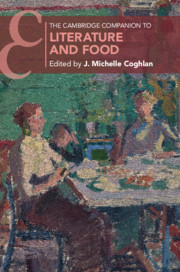Book contents
- The Cambridge Companion to Literature and Food
- The Cambridge Companion to Literature and Food
- Copyright page
- Contents
- Illustrations
- Contributors
- Acknowledgments
- Chronology of Major Works and Events
- Introduction: The Literature of Food
- 1 Medieval Feasts
- 2 The Art of Early Modern Cookery
- 3 The Romantic Revolution in Taste
- 4 The Matter of Early American Taste
- 5 The Culinary Landscape of Victorian Literature
- 6 Modernism and Gastronomy
- 7 Cold War Cooking
- 8 Farm Horror in the Twentieth Century
- 9 Queering the Cookbook
- 10 Guilty Pleasures in Children’s Literature
- 11 Postcolonial Tastes
- 12 Black Power in the Kitchen
- 13 Farmworker Activism
- 14 Digesting Asian America
- 15 Postcolonial Foodways in Contemporary African Literature
- 16 Blogging Food, Performing Gender
- Selected Guide to Further Reading
- Index
- Cambridge Companions to Literature
13 - Farmworker Activism
Published online by Cambridge University Press: 17 March 2020
- The Cambridge Companion to Literature and Food
- The Cambridge Companion to Literature and Food
- Copyright page
- Contents
- Illustrations
- Contributors
- Acknowledgments
- Chronology of Major Works and Events
- Introduction: The Literature of Food
- 1 Medieval Feasts
- 2 The Art of Early Modern Cookery
- 3 The Romantic Revolution in Taste
- 4 The Matter of Early American Taste
- 5 The Culinary Landscape of Victorian Literature
- 6 Modernism and Gastronomy
- 7 Cold War Cooking
- 8 Farm Horror in the Twentieth Century
- 9 Queering the Cookbook
- 10 Guilty Pleasures in Children’s Literature
- 11 Postcolonial Tastes
- 12 Black Power in the Kitchen
- 13 Farmworker Activism
- 14 Digesting Asian America
- 15 Postcolonial Foodways in Contemporary African Literature
- 16 Blogging Food, Performing Gender
- Selected Guide to Further Reading
- Index
- Cambridge Companions to Literature
Summary
This chapter examines twentieth and twenty-first century US farmworker literature. It argues that US farmworker literature distinguishes itself from the Jeffersonian agrarianism dominant in literary and cultural representations of US farmers by not only exposing the systems of power and privilege through which farmworkers are exploited, but also positioning farmworkers as key conveyors of environmental knowledge. And it shows how farmworker epistemologies in US literature and culture offer a critical vantage point on both the industrial food system and the larger systems of colonialism, capitalism, and racism upon which the industrial food system relies. The chapter considers Sanora Babb’s Whose Names Are Unknown (1939), Carlos Bulosan’s America Is in the Heart (1946), and Helena María Viramontes’s Under the Feet of Jesus (1995) as examples of farmworker literature that both address the conditions of exploitation facing farm laborers in the industrial food system, including economic and environmental violence, and foreground farmworkers’ environmental knowledge.
Keywords
- Type
- Chapter
- Information
- The Cambridge Companion to Literature and Food , pp. 197 - 214Publisher: Cambridge University PressPrint publication year: 2020

